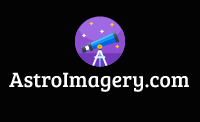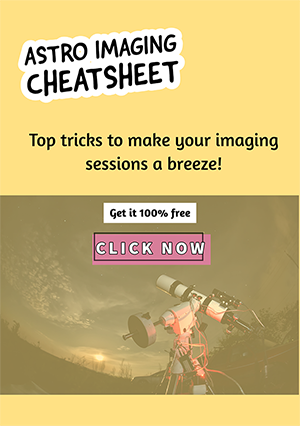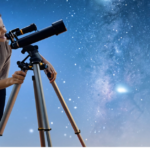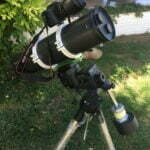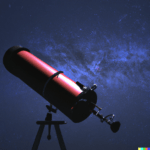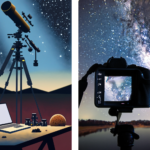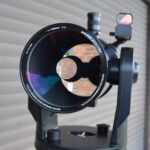Table of Contents
Most of those who begin in astrophotography start by photographing the obvious targets, like the moon or the Milky Way. Some may already have a DSLR camera, and others may wish to buy one. Therefore, one of the first questions they might ask is: which brand of DSLR is better, Nikon or Canon for astrophotography? On this page, we are going to go deep and try to answer this question.
Canon or Nikon for astrophotography, which is better? Canon has a wider range of models suitable for astrophotography than Nikon, but the newer models of Nikon, particularly mirrorless versions, have become much more popular since about 2018.
It is mostly a matter of taste and personal preference which of these two brands is actually better and I think most would agree that they are generally equal in their general performance as astrophotography cameras.
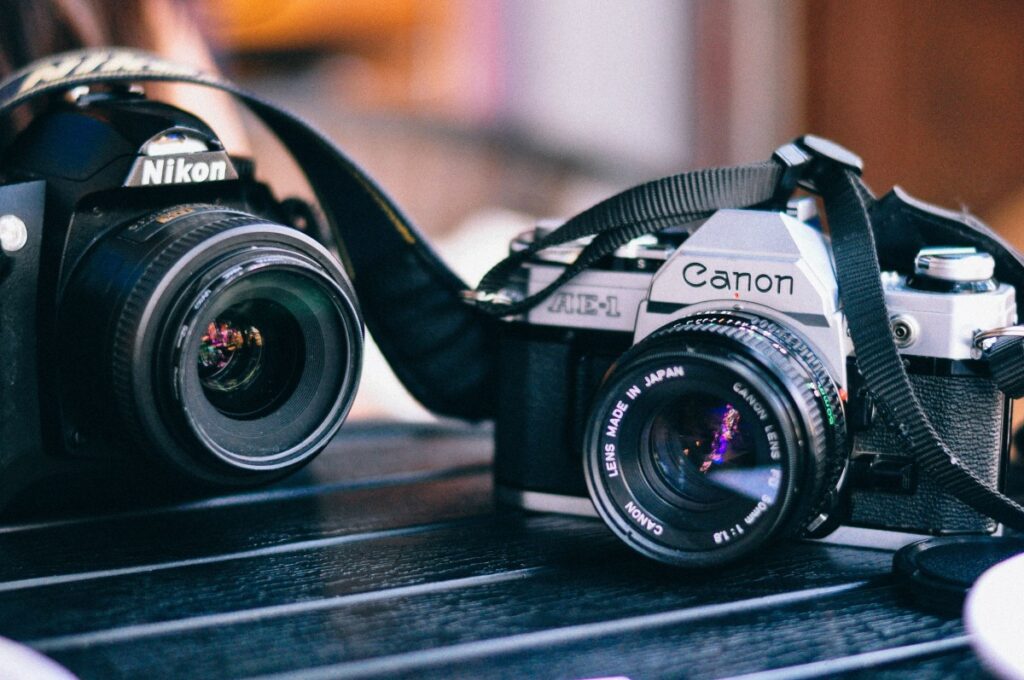
Reasons Why Canon Might be Better for Astrophotography
There are many reasons why you might prefer to use a Canon DSLR for astrophotography, what are some of the main reasons?
- Canon has a history of communicating with the astrophotography community and has in the past produced specific models such as the Canon 700da and the EOS 6da amongst others.
- Canon is reputably better than Nikon for video.
- Many believe Canon has better service.
- Canon DSLRs are more compatible with the software and the drivers used for astrophotography programs that we use for imaging and stacking.
- Modifications to the body of Canon cameras are said to be easier and are therefore more common.
- Canon is still the most popular brand of DSLR and this may mean that service and spare parts are easier to get hold of. It may also result in cheaper parts.
- Canon has the best lens design and arguably the best image quality in its range of lenses, especially the newest ones.
Reasons Why Nikon is the Best Choice for Astrophotography
- Many consider that Nikon uses better sensors which tend to be manufactured by Sony.
- Nasa seems to favour the use of Nikon lenses. They have tested both Canon and Nikon in space and have chosen to use only Nikon on the International Space Station. The reason? Reliability and endurance in space. Quite a recommendation!
- Older lenses can still be used on new Nikon cameras, unlike many older lenses produced by Canon that cannot be used on their newer models.
- Nikon cameras are said to have a longer battery life which can be very helpful in astronomical photography.
- Many people say that Nikon sensors are more sensitive in low-light conditions because they have no blocking filter.
- Nikon has many great value less expensive lenses that are of good quality.
- Nikon has incredible zoom lenses which can be used for astrophotography.
Nikon or Canon for Astrophotography? Which is better for Beginners?
When I wanted to start astrophotography back in 2020, I was looking for a cheap and easy way into the hobby and found that for me that was to buy an older DSLR manufactured by Canon. This is probably the best choice to start with if you’re on a budget and don’t know so much about photography. This was my situation and I haven’t regretted that choice.
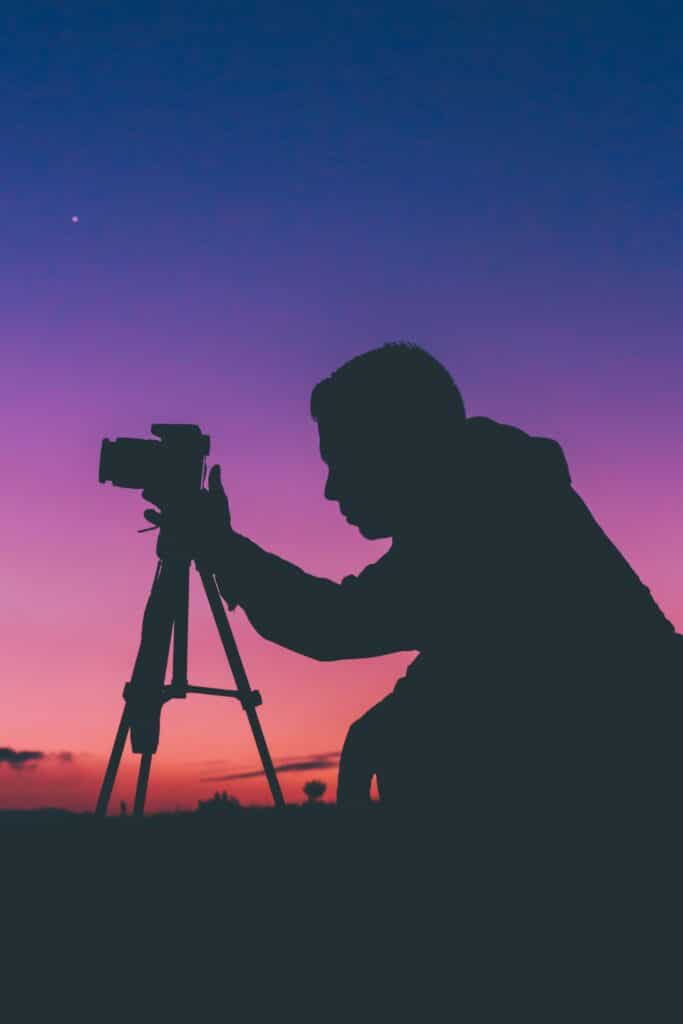
As I have become more experienced, I have begun to understand that other camera manufacturers, such as Nikon, have some great cameras that are brilliant for astrophotography. But, as camera manufacturers know, once you buy a camera and a lens, it is difficult to change as the lenses are not interchangeable between these two brands. As you spend more, your commitment to the brand you have chosen increases, and your reluctance to change does too. This is why, in this area, there is a high level of brand loyalty behind the choice between Nikon and Canon.
This is why, for many astrophotographers, the question Nikon or Canon for astrophotography is probably not so important. But it might be for the beginner.
More about which brand DSLR you should choose below where we compare the opinions of some of the leading astrophotographers online.
A Look at Some of the Research About Canon and Nikon for Astrophotography
We are going to look closely into the research in the following studies and surveys:
- Skiesandscopes.com survey into the cameras that are used most in the top pictures from the Astronomy Photographer of the Year from 2019 to2021. Check the survey here
Canon has more models used by top photographers in The Astronomy Photographer of the Year. 23 different models of Canon cameras were used compared to just 16 for Nikon. This would suggest that Canon appears more versatile and offers greater choice to the budding astrophotographer.
Another interesting point is that Canon represented about 8% more than Nikon of the top-quality images in the competition in 2019, but following this, there was a huge change in preference. In 2020 and 2021 Nikon was more popular than Canon by 8-10%. This suggests that from 2020 onwards the newer models of Nikon were seen as better for astronomy/ astrophotography.
- 2. Nikon or Canon for Astrophotography – see this page for more detailed information
Overall, according to Chris V.D. Berge, in his report at DSLR-astrophotgraphy.com, generally Nikon seems to outperform Canon in most cases. In the range of cameras priced between $600 and $1300 Nikon seems to come out on top and has better dynamic range, colour depth, and ISO performance in low-light conditions. This is because the sensors that Nikon use seem to be of a higher quality than those used by Canon, for the same price.
- 3. Alan Dyer’s review of Nikon D750 and Canon 6D cameras – check the review in full here
These two cameras were both praised highly for use in astronomy, but Dyer preferred the Canon 6D for deep sky imaging and the Nikon D750 for nightscape photography. The main differences were that the Canon had more colour noise, but slightly less vignetting than the Nikon. The Canon 6D also needed to be correctly exposed at the right ISO or it had bad noise in the dark areas. Nikon does not suffer from this important aspect which is all the more important in low-light conditions such as we use in astrophotography.
Best Models from Canon for Astrophotography
There are several models which are particularly recommended for astrophotography. Let’s list some of the best ones:
- EOS Digital Rebel SL2
- EOS Digital Rebel SL3
- EOS Digital Rebel T6i
- EOS Digital Rebel T6s
- EOS Digital Rebel T7i
- EOS Digital Rebel T8i
- EOS 70D
- EOS 77D
- EOS 80D
- EOS 90D
- EOS 6D
- EOS 6D Mark II
- EOS 5D Mark II
- EOS 5D Mark III
- EOS 5D Mark IV
- 5DS
- 5DS-R
- EOS 7D Mark II
- EOS M6
- EOS M6 Mark II
- EOS R5
- EOS R6
- EOS Ra – Mirrorless – full-frame sensor – 30.3MP – has a touchscreen – designed to enhance sensitivity to hydrogen-alpha in nebulae.
Best Nikon Camera Models for Astrophotography
- D500
- D600
- D610
- D700
- D750
- D800
- D810
- D850 – High resolution – 45.7MP – excellent battery life and full-frame DSLR.
- Z6
- Z6 II
- Z7
- Z7 II
Nikon or Canon for Astrophotography, which models are recommended by astronomers?
| Recommended by who and why | Model | Price | Level |
| Antoine and Dalia Grelin (Galactic-Hunter.com) Cheap but good quality and excellent results | Canon EOS T8i Nikon D7500 | less than $900 | Beginner |
| as above Very popular, with better image quality than the models above. | Canon EOS 80D Canon 7D Mk. II Nikon D500 | $900-1500 | Intermediate |
| as above Incredible cameras for astrophotography, sensors designed for high sensitivity to imaging Astro targets. | Nikon D810a Canon EOS 5D Mk. IV Canon EOS Ra | more than $2000 | Advanced |
| Trevor Jones (Astrobackyard.com) Good software and many choices of lenses | Canon Rebel T7i Nikon3400 | $899 | Beginner |
| as above Fantastic cameras for astrophotography. | Canon EOS 5D Mk. IV Nikon D850 | $1,800 | Advanced |
| SkyatNightMagazine.com Excellent noise management, and excellent image quality. | Canon EOS 1000D Nikon D700 | $499 | Beginner |
| as above ISO extended range, good level of noise, and dynamic range | Canon EOS 1D X | $6,799 | Advanced |
In Conclusion
Do we have a conclusive answer? What do you think—Nikon or Canon for astrophotography?
As we have seen, there is really little to choose from between the two biggest brands of cameras. Choosing either Nikon or Canon for astrophotography is open to discussion. There are some differences in different kinds of cameras, such as mirrorless cameras, where Canon leads the way; however, it is largely personal taste that is the deciding factor in choosing either one of these camera manufacturers. Whatever you are looking for in a camera, be it your first DSLR or if you are a more advanced photographer, both Nikon and Canon have much to offer.
So which is best, Nikon or Canon for astrophotography? That’s hard to say, they are both good. Really, the choice is yours. Any of the above models should meet your needs as an astrophotographer, depending on your level and tastes.
